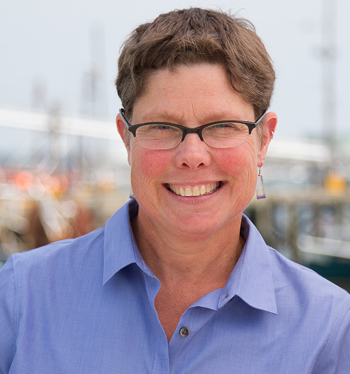Leigh Peake, Chief Education Officer, Gulf of Maine Research Institute
 Since 2005, the Gulf of Maine Research Institute (GMRI) has conducted interdisciplinary research on the Gulf of Maine ecosystem by collaborating with the communities whose lives and livelihoods depend on that ecosystem. An extraordinary marine heatwave in 2012 made apparent that community-engaged research would be critical to supporting resilience given the rapidity of ocean warming in our region. Species were adapting and changing faster than more traditional scientific approaches could document. As a result, climate change has become the centerpiece of GMRI’s outreach and education with a wide variety of audiences -- whether fishers and seafood professionals adjusting to shifting species dynamics, municipalities facing the impacts of sea level rise, or in- and out-of-school educators engaging the next generation of ecosystem stewards.
Since 2005, the Gulf of Maine Research Institute (GMRI) has conducted interdisciplinary research on the Gulf of Maine ecosystem by collaborating with the communities whose lives and livelihoods depend on that ecosystem. An extraordinary marine heatwave in 2012 made apparent that community-engaged research would be critical to supporting resilience given the rapidity of ocean warming in our region. Species were adapting and changing faster than more traditional scientific approaches could document. As a result, climate change has become the centerpiece of GMRI’s outreach and education with a wide variety of audiences -- whether fishers and seafood professionals adjusting to shifting species dynamics, municipalities facing the impacts of sea level rise, or in- and out-of-school educators engaging the next generation of ecosystem stewards.
As I reflect on a decade of climate-focused education, a universal lesson emerges: our individual and collective ability to both produce and make sense of models underpins our ability to make sense of climate change forecasts and support effective decision making for resilience. The DRK-12 community has an opportunity to better understand the cognitive work humans of all ages do when encountering complex models and describe the kinds of learning experiences and environments that best support that cognitive work for unique audiences of learners.
A corollary lesson from our work is that community-held knowledge has a tremendous influence on participants’ ability to make meaning from models and plays a critical role in improving community planning for resilience. Some examples:
- When we convene fishery managers and stakeholders to look at species data, it’s clear that fishers’ on-the-water experience enhances their ability to make sense of population dynamics models.
- When coastal communities contribute to investigations of sea level rise and coastal flooding, they simultaneously ground-truth tide-gauge data and build critical background knowledge that powers their participation in resilience planning based on models of future flooding.
- In classrooms, pairing community science investigations of outdoor ecosystems with observation of physical microcosms in the classroom helps students generate questions about changing ecosystems that they can pursue using the skills of data science.
As one fourth-grade teacher noted, “Participating as students, playing the modeling ‘games,’ I realized how accessible climate change education can be, even for younger children.” By approaching climate change through the lens of modeling, we both teach important NGSS-aligned skills and invite learners to become active contributors to vibrant, resilient communities.”